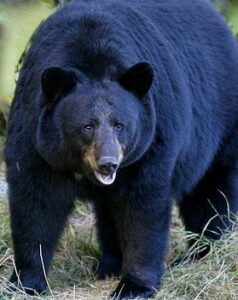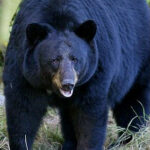The gouges on our garage door were deep and angry, ripping into the old wood, leaving splinters scattered across the breezeway. Our porch, too, had been attacked, the screens sliced diagonally, the cuts clean as a razor — or a bear claw. A very hungry black bear, it turned out, roused too early from its somnolence by this year’s weirdly warm winter weather.
Black bears are a regular feature of life in the Berkshires. Harmless for the most part, sometimes even comical. One summer, several years back, we had one break into our garage, pull out a full bag of bird seed, and proceed to sit under the trees at the top of the drive, bag between his legs, shoveling seed into his mouth and refusing – despite the banging of trash can lids – to leave. The cop who was finally called had no better luck with his horn and flashing lights. It wasn’t until he turned on the siren that the bear, with visible disgust, got up and lumbered away. He was spotted again, hours later, at the bottom of the driveway, gazing up longingly at the scene of the crime.
Bears, I’m told, can smell bird seed a mile away, and they never forget where they discovered a tasty treat. There’s a chance that our recent marauder is one and the same as our summer guest. Bears in the wild can live up to 30 years. If so, his visit this time was a lot less light-hearted. The claw marks and sliced screens testify to his innate brute strength – a male can weigh up to 600 pounds – and ravenous appetite. Though his hunger, unleashed perhaps by our warming planet, could very well be of our own making.
The Bear
by Susan Mitchell
Tonight the bear
comes to the orchard and, balancing
on her hind legs, dances under the apple trees,
hanging onto their boughs,
dragging their branches down to earth.
Look again. It is not the bear
but some afterimage of her
like the car I once saw in the driveway
after the last guest had gone.
Snow pulls the apple boughs to the ground.
Whatever moves in the orchard—
heavy, lumbering—is clear as wind.
The bear is long gone.
Drunk on apples,
she banged over the trash cans that fall night,
then skidded downstream. By now
she must be logged in for the winter.
Unless she is choosy.
I imagine her as very choosy,
sniffing at the huge logs, pawing them, trying
each one on for size,
but always coming out again.
Until tonight.
Tonight sap freezes under her skin.
Her breath leaves white apples in the air.
As she walks she dozes,
listening to the sound of axes chopping wood.
Somewhere she can never catch up to
trees are falling. Chips pile up like snow.
When she does find it finally,
the log draws her in as easily as a forest,
and for a while she continues to see,
just ahead of her, the moon
trapped like a salmon in the ice.




I’m confused. I thought bears hibernate in caves. Do some hibernate in fallen tree trunks, and if so how would they stay warm enough?
According to the Mass.gov site: “Bears in Massachusetts commonly den in brush piles, under fallen trees or a jumble of rocks, or in a mountain laurel or rose thickets.” I’ll have to keep an eye on my rose thickets!
Wow!! Is that a photo of the bear that was on your property?
I do believe global warming is a factor, as it is in so many things. My allergies are much worse here in Maine this season. I think global warming contributes to that.
No, thank heavens, that’s not our bear — but a shot I found on Wikipedia’s black bear site (which lets you use photos for free with attribution). Though I’ve seen plenty of bears on our property, I never seem to have the presence of mine to photograph them.
What a beautiful post, and poem.
Thank you, Fred.
A wonderful post, Liza! You pulled me right into the scene. My daughter, my Alden grandchildren and I vacationed several times in southern Vermont, one of my favorite places in the world. I remember one summer in early August, as we were eating lunch up on a high deck facing the lake, a bear lumbered through the yard scouring the ground for scraps of food we may have dropped around the fire pit. We all squealed with shock and delight, and a little bit of fear! Our bear exuded power and confidence, and clearly owned this beautiful patch of land some human had tried to clear. We were in awe.
The grandkids are older now. I will try to corral them to listen to me read your post. I hope their fond memories of love of Vermont will enable them to understand the threat we pose to the natural world.
Thanks for writing and sending this lovely anecdote. We face a big uninhabited mountain so have a lot of wild life coming and going — a great joy.
Barry, AWOTC
Sounds pretty scary. Better he eat the seed and not the bird, just don’t run out
of birdseed.
Thank you, AWOTC. An excellent point about stocking up on birdseed!
Loved the bear, loved the poem.
Not that I need to meet a bear of his size anytime soon!
Enjoyed it, thanks.
Beata
Thanks, Beata. I don’t think you have to worry too much about running into one on the Upper East Side.
Although not a dangerous animal, they still instill a lot of fear in me. Better to look through your window because they are an awesome sight. Lovely poem….
Thanks, Em.
They say not to feed wild animals, but it seems bears are good at helping themselves! I’d be inclined to leave a bag of bird seed at the end of the driveway…
I wonderful suggestion! Thank you, Carole.